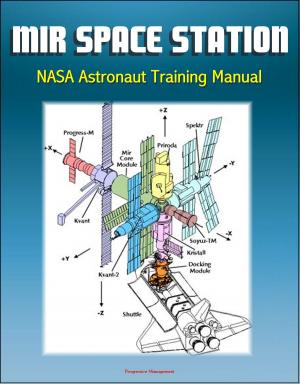Historical Studies in the Societal Impact of Spaceflight: Apollo Moon Landings, Application Satellites, Nuclear Power, Planetary Probes, Role in Integrated Circuits, Medical Tech Spinoff, Environment
Nonfiction, Science & Nature, Technology, Aeronautics & Astronautics, Science, Physics, Astrophysics & Space Science| Author: | Progressive Management | ISBN: | 9781310200168 |
| Publisher: | Progressive Management | Publication: | March 27, 2016 |
| Imprint: | Smashwords Edition | Language: | English |
| Author: | Progressive Management |
| ISBN: | 9781310200168 |
| Publisher: | Progressive Management |
| Publication: | March 27, 2016 |
| Imprint: | Smashwords Edition |
| Language: | English |
Professionally converted for accurate flowing-text e-book format reproduction, this excellent new book from NASA presents a series of in-depth studies on specific subjects on the societal impact of spaceflight. It represents an effort to understand the mutual interaction of space exploration and society—part of a larger need to understand the relationship between science, technology, and society. Emphasizing the importance of public attitudes toward space, the volume opens with sociologist William Sims Bainbridge's study of the impact of space exploration on public attitudes.
"Spinoff" is the first aspect that comes to mind for most people who think at all about the impact of space exploration, those technologies that are thought—wrongly or rightly—to have emanated from the space program. Part II consists of case studies of specific potential spinoffs and explicitly raises the difficult questions of what can be considered spinoff and how much of any particular claimed spinoff can be attributed to NASA—thus the interrogatory "Spinoff?" title for this section rather than the usual declarative "Spinoff." Though NASA claims many spinoffs and publishes an annual Spinoff report, it seldom parses its claims very finely. The three chapters in this part aim to do just that. Bainbridge's study of medical technology reinforces the judgment of social scientists who wrote 30 to 40 years ago that spinoffs are a problematic concept: they may not reflect the most important channels by which NASA contributes to scientific and technological progress, even if they do provide coherent stories to communicate with the general public about the history of space exploration.
Andrew J. Butrica tackles the oft-made claim that NASA played a major role in the early development and use of integrated circuits. In particular, he addresses a specific question: What was the role of NASA in improving the manufacture of integrated circuits during the Apollo era? Butrica finds that the answer is not so simple. In a second and related essay, he shows that another claim—that the multibillion-dollar industry known as MEMS (microelectromechanical systems) originated at NASA—was actually such a close collaboration with nearby Stanford University that this story is also much more complex than usually thought. Butrica's conclusions are also in accord with an earlier finding that even if a particular spinoff can be attributed in whole or in part to NASA, attribution to individuals is still more difficult.
Historical Studies in the Societal Impact of Spaceflight * PART I - OPINION * Chapter 1 - The Impact of Space Exploration on Public Opinions, Attitudes, and Beliefs - William Sims Bainbridge * PART II - SPINOFF? * Chapter 2 - Societal Impact of NASA on Medical Technology - William Sims Bainbridge * Chapter 3 - NASA's Role in the Manufacture of Integrated Circuits - Andrew J. Butrica * Chapter 4 - NASA's Role in the Development of MEMS (Microelectromechanical Systems) - Andrew J. Butrica * PART III - THE WORLD AT LARGE * Chapter 5 - Powering Space Exploration: U.S. Space Nuclear Power, Public Perceptions, and Outer Planetary Probes - Roger D. Launius * Chapter 6 - NASA and the Environment: An Evolving Relationship - W. Henry Lambright * Chapter 7 - Societal Impacts of Applications Satellites - David J. Whalen * Chapter 8 - Impacts of the Apollo Program on NASA, the Space Community, and Society - Eligar Sadeh * Chapter 9 - An Astrosociological Perspective on the Societal Impact of Spaceflight - Jim Pass
Professionally converted for accurate flowing-text e-book format reproduction, this excellent new book from NASA presents a series of in-depth studies on specific subjects on the societal impact of spaceflight. It represents an effort to understand the mutual interaction of space exploration and society—part of a larger need to understand the relationship between science, technology, and society. Emphasizing the importance of public attitudes toward space, the volume opens with sociologist William Sims Bainbridge's study of the impact of space exploration on public attitudes.
"Spinoff" is the first aspect that comes to mind for most people who think at all about the impact of space exploration, those technologies that are thought—wrongly or rightly—to have emanated from the space program. Part II consists of case studies of specific potential spinoffs and explicitly raises the difficult questions of what can be considered spinoff and how much of any particular claimed spinoff can be attributed to NASA—thus the interrogatory "Spinoff?" title for this section rather than the usual declarative "Spinoff." Though NASA claims many spinoffs and publishes an annual Spinoff report, it seldom parses its claims very finely. The three chapters in this part aim to do just that. Bainbridge's study of medical technology reinforces the judgment of social scientists who wrote 30 to 40 years ago that spinoffs are a problematic concept: they may not reflect the most important channels by which NASA contributes to scientific and technological progress, even if they do provide coherent stories to communicate with the general public about the history of space exploration.
Andrew J. Butrica tackles the oft-made claim that NASA played a major role in the early development and use of integrated circuits. In particular, he addresses a specific question: What was the role of NASA in improving the manufacture of integrated circuits during the Apollo era? Butrica finds that the answer is not so simple. In a second and related essay, he shows that another claim—that the multibillion-dollar industry known as MEMS (microelectromechanical systems) originated at NASA—was actually such a close collaboration with nearby Stanford University that this story is also much more complex than usually thought. Butrica's conclusions are also in accord with an earlier finding that even if a particular spinoff can be attributed in whole or in part to NASA, attribution to individuals is still more difficult.
Historical Studies in the Societal Impact of Spaceflight * PART I - OPINION * Chapter 1 - The Impact of Space Exploration on Public Opinions, Attitudes, and Beliefs - William Sims Bainbridge * PART II - SPINOFF? * Chapter 2 - Societal Impact of NASA on Medical Technology - William Sims Bainbridge * Chapter 3 - NASA's Role in the Manufacture of Integrated Circuits - Andrew J. Butrica * Chapter 4 - NASA's Role in the Development of MEMS (Microelectromechanical Systems) - Andrew J. Butrica * PART III - THE WORLD AT LARGE * Chapter 5 - Powering Space Exploration: U.S. Space Nuclear Power, Public Perceptions, and Outer Planetary Probes - Roger D. Launius * Chapter 6 - NASA and the Environment: An Evolving Relationship - W. Henry Lambright * Chapter 7 - Societal Impacts of Applications Satellites - David J. Whalen * Chapter 8 - Impacts of the Apollo Program on NASA, the Space Community, and Society - Eligar Sadeh * Chapter 9 - An Astrosociological Perspective on the Societal Impact of Spaceflight - Jim Pass















